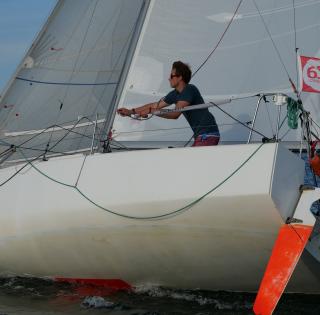
Identity sheetCreation: 2018 |

Prevention is achieved through information actions.
The unit has set up several exhibitions in the reception hall and in the media library (international or national days on women's rights / day against racism and anti-Semitism). This information was relayed via the social networks of the school's and the student's office (BDE), on ENSTA Bretagne's Internet and Intranet sites, etc. A film evening was also organised with the screening of a documentary, and posters on the prevention of sexual and sexist violence were also hung up in key places on campus.
This being said, the key point of prevention involves training. Indeed, discrimination, harassment and violence are part of patterns or systems whose mechanisms are sometimes far-reaching. Stereotypes and prejudices are strongly rooted in cultures and partly shape our behaviour. Regular and recurrent training activities are essential to working over time to de-construct the mechanisms of violence. This is a key but "long-term" component.
There are two types of training:
Training for students:
- some training is included in engineering courses: a 2-hour workshop on discrimination, harassment and violence for all first-year students, a course in November + an optional module in semester 4 on "diversity management and CSR" (optional course - about 20 students take it).
- other training courses are offered as and when needed, such as the workshops against street harassment that were organised in cooperation with the Stand up program
- and finally, those for the Students' Office (BDE - Bureau des Élèves) and the BAR (Brigade Anti Relou - Anti-harassment brigade): the elected BDE and also the BAR follow a dedicated workshop. Cécile Plaud leads this workshop, provides a reminder of the legal framework and explains how to help a victim as well as the protocol in the event of a situation.
Training for staff:
Normally, 3-hour training workshops are regularly offered to staff. Due to the health situation, the last workshops could not be held as face-to-face training was much preferable. These workshops are led by an external member of the network of equality and diversity officers. These workshops are offered on a voluntary basis. Other training initiatives are in the pipeline, in particular under the impetus of the equal opportunities for women and men plan.
The "action" aspect of the unit involves providing support and reassurance for people who are targeted by violence, harassment and discrimination as well as witnesses.
The primary action of the unit is to listen to victims and, if necessary, reassure/protect them and refer them to specialized support structures. Depending on the situations or cases of which it is aware, the unit may then call for an investigation be carried out for the purpose of initiating disciplinary proceedings.
What is at stake here is crucial: listening to people who have experienced situations, telling them that they are not guilty and giving them initial advice to guide them is an important and essential step.
Cécile Plaud, in charge of the Stop Discri unit, explains how it works.
What is your role and how does the unit work?
My role is to initiate, coordinate, propose and represent our school in certain bodies. In this task, I am supported by a network of volunteer staff, PhD students and other students. The health situation has made the way we operate more complex. We used to meet about once a quarter during the lunch break. These meetings provided an opportunity to discuss our future actions, campus life, the difficulties encountered and the results of past actions. The health situation has made these meetings somewhat obsolete, as to hold them remotely pose problems and the implementation of actions on campus is also very limited.
It should be noted that all the network volunteers sign an agreement stating that they will not disclose confidential information relating to individual situations.
I would like to stress the important work carried out by the BDE: since this organization was set up, things have evolved very positively and the BDE and myself now work very closely together which is great news. This testifies to the strong feelings our students have about these issues and their concern for the campus to be a caring, welcoming and open space.
If a problem arises or someone needs advice, how can students and staff contact you?
|
There are several possibilities:
|
Generally, from the student perspective, the information comes through them: they come and see me either as a victim or as witnesses. Based on my experience, I have also seen that cycle supervisors or teachers are also very vigilant and alert me when situations arise.
In all cases, my role is to: listen to and reassure the victim. Then advise them on the steps that can be taken. Nothing is done (for example, alerting the administration) without the victim's explicit consent. This is an essential point as, other than in cases of serious danger, the victim is the only person who can decide what to do. Depending on the situation, the facts are then brought to the attention of the administration, and a written record of the facts is kept.
The rest is up to the school administration: an investigation may be initiated, which can lead to disciplinary proceedings.
Is the unit included in one or more networks?
The school is part of the CPED (conférence permanente des chargée.es égalité et diversité - permanent conference of equality and diversity officers). I am also a member of the CGE's equality commission.
What is your assessment of the stop discri unit, since its creation?
The unit was set up in January 2018. My overall assessment is the same as what is happening in society as a whole with the "liberation of speech".
Some time ago, a person expressed their concern to me because several things had happened in a short period of time. This might have suggested that the situation was getting worse. In my opinion, this is not the case. There is no more going on in our school now than there was previously. What has changed is that there is a well-identified space for victims and witnesses to be heard if they so wish.
The other very positive point in the assessment is the mobilization of our students that, through the BDE, have for 2 years been firmly and tangibly committed against harassment, violence and discrimination. I am also thinking about the creation of the BAR and the voluntary commitment of some people to the network. This shows a certain sense of responsibility, which is stimulating and reassuring.
They are the up-and-coming generation that are soon to embark on their working life. And they will thus begin work (for FIPA it is already the case!) with crucial values such as equality, inclusion, solidarity and sisterhood. Not only are these values their own, but they translate them into initiatives and commitment. I would like to thank them for this. This is a fight that will go on for as long as situations continue to occur.
One last point, perhaps, relating to this general assessment: I sometimes see some resistance to the actions carried out by the network. Either through a form of negation (for example, "there is no racism in the school", "yes of course there are some jokes but it's not serious really!") or by more incisive comments or behaviour. I think this testifies to the significance of our actions. It is not always easy to say what is wrong and it is also sometimes more protective to pretend that it does not exist or involves other categories of individuals. The actions carried out by the network highlight certain realities that may be cause offence.
I think the most important thing is that it opens up debate, dialogue and insight.


















